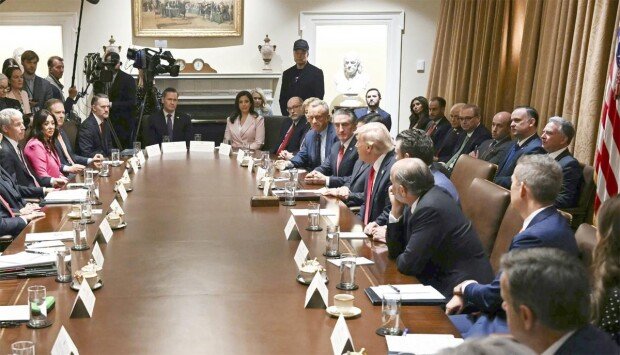Trump intends to slap 25 percent tariffs on EU exports
Trump intends to slap 25 percent tariffs on EU exports
Posted February. 28, 2025 08:23,
Updated February. 28, 2025 08:23

“The European Union was formed in order to screw the United States,” said U.S. President Donald Trump at the first cabinet meeting since his second term began in the White House on Wednesday. Zeroing in on the E.U., he claimed that major European nations have only exported a limited volume of U.S. cars and agricultural goods, signaling that Washington will soon levy a 25 percent tariff in effect on all E.U. imports, including car brands.
President Trump has already announced a high-rate tariff policy on Canada and Mexico, among the U.S. allies sharing the borderlines. Furthermore, he has explicitly taken sides with Russia, which is responsible for the invasion of Ukraine. He even harshly criticized the E.U., one of Washington’s key allies, while making it clear that expensive tariffs should be imposed. Experts argue that Trump's recent moves contradict the U.S. diplomatic and commerce policy framework.
President Trump’s remarks were met with a backlash from the E.U. community. “The European Union is the world’s largest free market. And it has been a boon for the United States,” European Commission trade spokesman Olof Gill stated. “The E.U. will react firmly and immediately against unjustified barriers to free and fair trade.”
President Trump explicitly criticized the E.U., the United States’ largest trading partner, pointing out the estimated 300-billion-dollar trade deficit with the E.U. He went on to say that it has taken advantage of the United States in a different way than Canada, adding that it does not embrace U.S. cars and agricultural produce. He even claimed that it was created to “screw” the United States.
According to the United States Trade Representative, the country saw a trade deficit of 235.6 billion dollars with the E.U. as of last year, more than 69 billion dollars lower than Trump’s claims. Using such inflated figures further demonstrates his negative stance towards the E.U.
President Trump said the E.U. could not successfully retaliate in the tariff field. “We don’t buy anymore. And if that happens, we win,” he said, referring to the country as the “pot of gold.” His message seemingly highlighted the “might makes right” principle by implying that the United States can make any trading partner kneel down because it has the upper hand in terms of economic and military power.
The U.S. president appeared confused about the timeline for imposing the previously announced 25% tariffs on Mexico and Canada. Initially, he had stated that he would impose tariffs on both countries next month. However, he said on Wednesday that the tariffs would take effect on April 2.
Afterward, Commerce Secretary Howard Lutnick said in an interview with Fox News that the 25 percent tariff policy on the two countries, which will go into effect next month, serves as a punitive measure for their failure in controlling illegal immigrants and pentenyl transactions. As for the tariff system scheduled in April as per Trump’s remarks, the secretary clarified that it is part of “reciprocal tariffs.” On this day, the new United States Trade Representative (USTR) Jamieson Greer, who will lead the Trump administration's second-term trade war efforts, was confirmed by the Senate.
President Trump also emphasized a transactional approach toward diplomatic relations. With China, the biggest competitor and security threat to Washington, in mind, he hoped China would invest in the United States, saying, “We'll do things with China.” It was interpreted as his intention to forge economic cooperative ties with Beijing.
Asked if Washington would try to protect Taiwan in case of China’s invasion, President Trump refused to reply, saying, “I don't want to ever put myself in that position.” Likewise, he told NBC in September 2023 that he would not comment on the issue because he did not want to let others get what they want.
Washington, which severed diplomatic ties with Taiwan and formed relations with China in 1979, maintains a strategically vague policy note by supporting the “One China” principle but selling weapons to Taiwan for stronger military cooperation.
However, President Trump also emphasized that China cannot capitalize on the United States, making it clear that he would not put up with the trade deficit with China, which reached 295.4 billion U.S. dollars last year, as well as China's overproduction and dumping of goods.
Regarding the mineral agreement with Ukraine, which has been criticized as an “exploitation of a weaker country," he stressed that it would increase U.S. wealth, promising to continue to make such successful “deals” in the future.
이지윤기자 asap@donga.com






